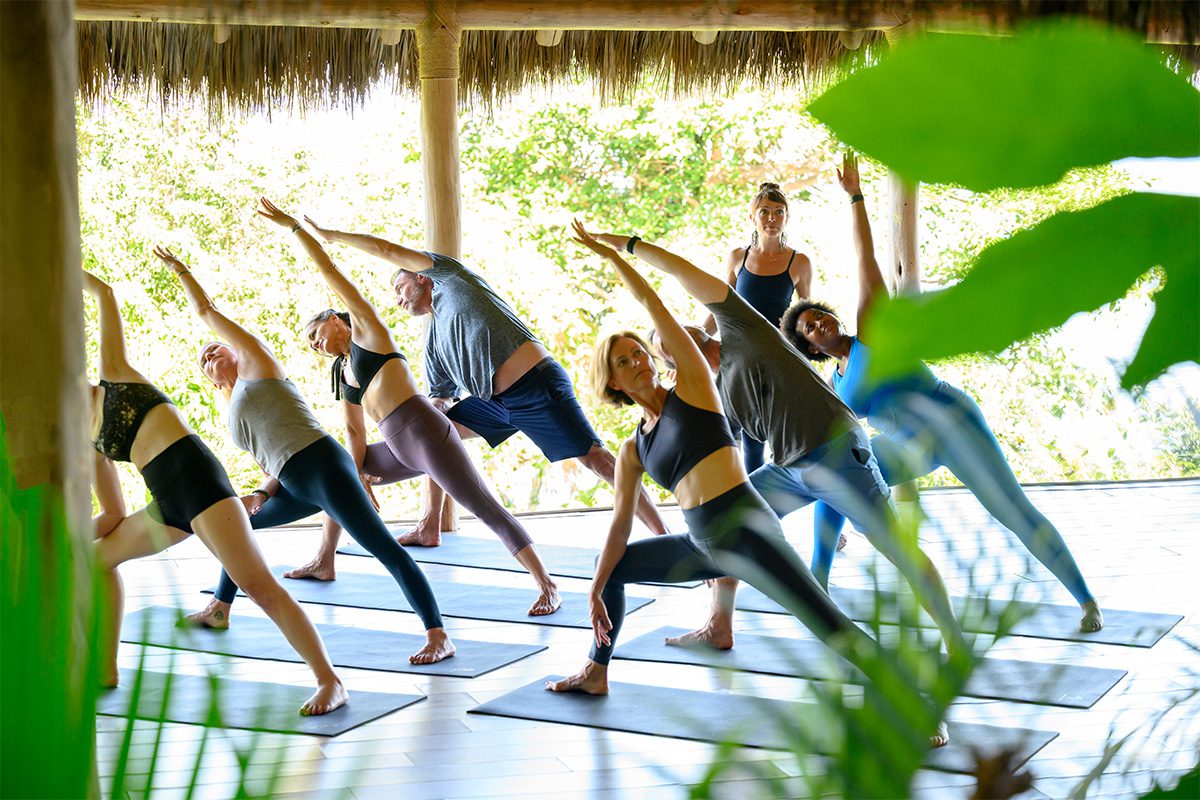Yoga retreats offer a unique opportunity for individuals to immerse themselves in a holistic journey of self-discovery, mindfulness, and rejuvenation. As a yoga instructor, organizing a retreat can be an incredibly fulfilling and transformative experience, both for you and your participants. One of the most critical elements in creating an exceptional yoga retreat is crafting the perfect theme. A well-thought-out theme sets the tone for the entire retreat, guiding the practices, workshops, and experiences you offer. In this comprehensive guide, we will explore the art of crafting the perfect retreat theme that resonates with your vision and leaves a lasting impact on your students.
The Power of a Thoughtful Theme
Before diving into the process of crafting your retreat theme, let’s first understand why it’s so essential. A thoughtful theme serves as the foundation upon which you build your entire retreat experience. It provides cohesion and purpose, making your retreat memorable and transformative. A well-crafted retreat theme is more than just a catchy phrase or a superficial concept. It serves as the heartbeat of your retreat, infusing every aspect with intention and purpose.
How a compelling theme enhances the overall retreat experience
A retreat theme sets the stage for a transformative journey. It provides a unifying thread that weaves together the practices, workshops, and experiences into a cohesive narrative. Think of it as the foundation upon which the entire retreat is built. When participants step into this carefully crafted world, they’re not just attending yoga classes and workshops; they’re embarking on a meaningful and holistic adventure.
Imagine a retreat with the theme “Awakening the Inner Warrior.” In this context, every yoga class becomes a warrior’s journey, every meditation session a moment of inner strength, and every group activity an opportunity to discover one’s inner power. This thematic approach elevates the retreat from a series of disconnected events to a profound and purposeful experience.
The psychological impact of a well-chosen theme on participants
Themes have a profound psychological impact on participants. They provide a sense of direction, purpose, and unity. Participants feel that they are part of something more significant than themselves, which can be deeply motivating and inspiring.
A well-chosen theme can tap into participants’ emotions, making the retreat experience more meaningful and memorable. For example, a theme centered around self-love and self-acceptance can encourage participants to let go of self-criticism and embrace self-compassion. This psychological shift can have a lasting impact on their overall well-being and mindset.
Real-life examples of successful retreat themes and their outcomes
To illustrate the power of retreat themes, let’s explore some real-life examples:
Journey to Inner Harmony
This retreat theme focused on the concept of inner balance and harmony. Participants reported feeling more centered, emotionally stable, and better equipped to manage life’s challenges after the retreat.
Nature’s Healing Embrace
This theme immersed participants in the beauty and serenity of nature. Many attendees found a deep sense of connection to the natural world and a renewed commitment to environmental stewardship.
Awakening the Creative Spirit
Centered around creative expression and self-discovery, this retreat theme inspired participants to explore their artistic side and led to a newfound sense of creativity and self-expression.
These examples demonstrate how a well-crafted theme can resonate with participants on a profound level and lead to transformative outcomes.
In the subsequent chapters of this guide, we will delve deeper into the process of finding inspiration, defining your retreat’s focus, and practical steps for integrating your theme into every aspect of the retreat, creating an unforgettable experience for both you and your participants.
Finding Inspiration for Your Theme
Finding the right inspiration for your retreat theme is a creative process that can greatly influence the overall success of your event. Here’s how to draw inspiration effectively:
Nature and Surroundings
Nature often serves as a powerful muse for retreat themes. The natural beauty of your retreat location can inspire themes like “Ocean’s Serenity,” “Mountain Retreat,” or “Jungle Oasis.” The sights, sounds, and energy of the environment can infuse your retreat with a unique ambiance.
Personal Journey
Your own personal journey and experiences can be a rich source of inspiration. Reflect on your own growth, challenges, and transformation. Themes like “From Chaos to Calm,” “Self-Discovery,” or “Healing Hearts” can stem from your own life story and resonate deeply with your participants.
Yoga Philosophy
Delving into yoga philosophy can uncover profound themes that align with the principles of yoga. Concepts like “Finding Balance,” “Awakening the Chakras,” or “The Path to Enlightenment” can provide a strong philosophical foundation for your retreat.
Participant Needs
Consider the needs and aspirations of your students. What are they seeking in a retreat experience? Themes like “Stress Reduction,” “Empowerment,” or “Digital Detox” can address the specific needs of your participants.
Defining Your Retreat’s Focus
Once you have gathered inspiration, it’s essential to define the focus of your retreat theme. This involves clarifying the core message, intentions, and desired outcomes of your retreat:
Core Message
Summarize your theme’s core message in a single sentence or phrase. For example, if your theme is “The Journey Within,” the core message could be: “Embark on an inner exploration to discover your true self.”
Intentions
Clearly outline your intentions for the retreat. What do you hope participants will gain from this experience? Whether it’s self-discovery, stress relief, or personal growth, articulate your intentions to guide the retreat’s design.
Desired Outcomes
Consider the specific outcomes you aim to achieve with your retreat theme. These could include increased mindfulness, improved well-being, or enhanced self-awareness. Understanding your desired outcomes will inform the content and activities you plan.
Integrating Your Theme Throughout the Retreat
Once you’ve crafted a compelling theme and defined its focus, the next step is to seamlessly integrate it into every aspect of your retreat, Crafting Theme-Driven Practices and Workshops.
Yoga Classes
Design yoga classes that align with your theme. Incorporate thematic sequences, postures, and intentions into your sessions. For example, if your theme is “Empowerment,” your yoga classes could include poses that emphasize strength and self-confidence.
Meditation and Mindfulness
Infuse mindfulness and meditation practices with the essence of your theme. Guided meditations can take participants on a journey related to the theme, fostering a deeper connection to its message.
Workshops and Activities
Create workshops and activities that directly explore and reinforce your theme. These can include journaling exercises, group discussions, or creative arts workshops that allow participants to engage with the theme on a personal level.
Atmosphere and Decor
Set the ambiance of your retreat space to reflect the theme. Use colors, symbols, and decorations that evoke the essence of your chosen concept. This creates a visually immersive experience for participants.
Daily Rituals
Incorporate daily rituals or ceremonies that tie into your theme. Whether it’s a morning intention-setting ritual or an evening gratitude ceremony, these rituals deepen the retreat’s thematic experience.
Nurturing Connection and Community
A well-crafted retreat theme not only enhances personal growth but also fosters a sense of community among participants who pursue the same goal. In this chapter, we explore how your theme can strengthen bonds and create lasting connections among retreat-goers. We delve into strategies for group activities, discussions, and shared experiences that amplify the theme’s impact.
Fostering a Sense of Belonging
Begin your retreat by emphasizing the idea of belonging to a community with shared goals and interests.
Welcome rituals: Start with a welcoming ceremony or introduction session where participants can introduce themselves and share their intentions for the retreat.
Group intention-setting: Encourage participants to collectively set intentions aligned with the retreat theme, creating a sense of unity from the outset.
Group Activities and Workshops
Plan group activities and workshops that encourage collaboration, communication, and connection.
Ice-breaker activities: Use fun ice-breakers to help participants get to know each other and feel comfortable in the group.
Partner or small group exercises: Foster trust and connection through partner yoga, group discussions, or interactive workshops related to the theme.
Shared Experiences and Bonding
Design experiences that encourage participants to bond over shared challenges and achievements.
Group outings: Organize outings or excursions that align with your theme, such as a group hike, cultural exploration, or volunteer work.
Team-building exercises: Include activities that require teamwork and cooperation, reinforcing the sense of community.
Meaningful Discussions and Reflection
Create opportunities for participants to engage in meaningful discussions and reflection.
Group discussions: Host group discussions where participants can share their insights, challenges, and personal growth experiences related to the theme. At Xinalani and Mixto, we can set up a bonfire on the beach for you to lead this discussion in a comforting and inspiring atmosphere.
Guided reflection sessions: Offer guided journaling or reflection sessions to help participants internalize their learnings and connect on a deeper level.
Theme-Centric Evenings
Dedicate specific evenings to theme-centric activities or rituals that deepen participants’ connection to the theme.
Storytelling circles: Invite participants to share personal stories or experiences related to the theme, fostering empathy and understanding.
Rituals and ceremonies: Incorporate theme-specific rituals or ceremonies that create a sense of shared spirituality and purpose.
Open Communication Channels
Establish open communication channels for participants to connect and support each other during and after the retreat.
Create online groups or forums where participants can stay in touch, share resources, and continue discussions.
Encourage the exchange of contact information to maintain connections beyond the retreat.
By nurturing connection and community throughout your retreat, you not only enhance the overall experience but also create a supportive network that extends beyond the retreat’s duration. Participants who feel a sense of belonging and camaraderie are more likely to return for future retreats and recommend your offerings to others. In the next chapter, we’ll explore mindful workshops and practices that complement your theme, providing participants with valuable tools for personal growth and self-discovery.
Sustaining the Theme Beyond the Retreat
Your retreat theme doesn’t have to end when the retreat does. In this chapter, we delve into innovative ways to extend the theme’s influence beyond the retreat experience. We understand that the true value of your retreat lies in its lasting impact on participants’ lives. Here, we discuss how you can provide resources, support, and ongoing inspiration to help participants integrate the retreat’s teachings into their daily lives. Whether through follow-up materials, online communities, or post-retreat practices, sustaining the theme ensures that its profound impact endures long after the retreat has concluded.
Post-Retreat Resources
Develop a comprehensive package of post-retreat resources tailored to your theme. These resources could include e-books, audio recordings, or video tutorials that participants can access online.
Encourage participants to continue their journey by providing them with detailed guides, practices, and reading materials that align with the retreat’s teachings.
Create a dedicated webpage or platform where participants can easily access and download these resources at their convenience.
Online Communities
Foster a sense of community among your participants by creating an online platform or social media group dedicated to your retreat theme.
Encourage participants to join the community to stay connected with fellow retreat-goers, share their experiences, and receive ongoing support.
Facilitate discussions, Q&A sessions, and live webinars within the online community to keep participants engaged and motivated.
Monthly Themes and Challenges
Keep the retreat theme alive by introducing monthly themes or challenges that participants can participate in from the comfort of their homes.
Provide prompts, practices, or journaling exercises related to each theme, allowing participants to continue their personal growth journey.
Offer incentives or rewards for active participation, such as exclusive content or discounts on future retreats.
Virtual Retreat Reunions
Organize virtual retreat reunions or gatherings at regular intervals to reunite participants and reinforce the sense of community.
Host live virtual yoga classes, meditation sessions, or themed discussions that align with the retreat’s teachings.
These reunions serve as a reminder of the transformative experiences shared during the retreat.
Coaching and Support
Offer optional coaching or mentorship programs for participants who wish to dive deeper into the theme’s exploration.
Provide one-on-one or group coaching sessions, allowing participants to receive personalized guidance and support in applying the retreat’s teachings to their lives.
Create a structured program with specific goals and milestones to ensure participants continue their growth journey effectively.
By implementing these strategies, you ensure that your retreat theme transcends the boundaries of the retreat itself. Participants will appreciate the ongoing support and resources you provide, allowing them to integrate the retreat’s wisdom into their daily lives. This sustained connection not only enriches their personal growth but also strengthens their bond with your retreat offerings.
Measuring the Impact
A successful retreat theme leaves a lasting impact on participants’ lives, and it’s essential to assess and measure this impact to refine your future retreats. In this final chapter, we’ll delve into the crucial aspects of measuring the impact of your retreat theme:
Methods for Gathering Feedback
Implement post-retreat surveys or feedback forms to gather insights from participants about their experience with the theme. Include questions that focus on how the theme influenced their personal growth and well-being.
Conduct one-on-one follow-up sessions with select participants to gain in-depth feedback and testimonials. These personal interviews can uncover profound insights into the theme’s effect.
Encourage open and honest communication by creating a safe space for participants to share their thoughts, suggestions, and constructive criticism.
Evaluating Theme Effectiveness
Analyze the data gathered from feedback forms and surveys to evaluate the effectiveness of your retreat theme. Look for patterns and common themes in participants’ responses.
Assess whether the theme resonated with participants on an emotional and transformative level. Did it contribute to their personal growth, self-awareness, and well-being?
Compare the feedback from different retreats to identify trends and improvements that can be made to enhance future themes.
Leveraging Testimonials and Stories
Utilize participant testimonials and stories as powerful tools to showcase the theme’s influence. Encourage participants to share their journey, highlighting the specific ways in which the theme impacted their lives.
Incorporate these testimonials into your marketing materials, website, and promotional content to demonstrate the tangible benefits of your retreats.
Sharing real-life success stories can inspire potential participants and build trust in your retreat offerings.
Reflecting on Personal Growth
Take time to reflect on your own growth as a retreat leader through the implementation of the theme. Consider how facilitating the theme enriched your teaching skills, leadership abilities, and connection with participants.
Assess the effectiveness of your guidance and support in helping participants navigate their transformative journey. Identify areas where you excelled and areas for improvement.
Use your personal growth reflections to refine your future retreat themes and enhance your role as a facilitator of profound experiences.
Iterating and Refining
Embrace a continuous improvement mindset by using the feedback and insights gathered to refine your retreat themes. Incorporate suggestions and make necessary adjustments to enhance the impact of future retreats.
Stay open to innovation and experimentation. Explore new themes and approaches based on participant feedback and evolving trends in personal growth and wellness.
Commit to ongoing growth as a retreat leader, knowing that each retreat presents an opportunity for personal and professional development.
Measuring the impact of your retreat theme is not only a means of assessing success but also a pathway to growth and improvement. By understanding how your themes affect participants and leveraging their stories, you can continue to craft transformative retreat experiences that resonate deeply with your audience. This final step solidifies your commitment to creating retreats that leave a lasting imprint on the lives of those who embark on this journey of self-discovery and personal growth.
Real-Life Examples of Successful Retreat Themes
In this chapter, we explore real-life examples of successful retreat themes and their outcomes. Drawing inspiration from experienced yoga instructors and retreat leaders, you’ll gain insights into how different themes can resonate with participants and create meaningful experiences.
1. Journey to Self-Discovery
- Theme Overview: This retreat focused on guiding participants on a journey of self-discovery through yoga, meditation, and mindfulness practices.
- Outcomes: Participants reported increased self-awareness, a deeper connection to their inner selves, and a greater sense of purpose in their lives.
2. Balancing the Chakras
- Theme Overview: This retreat centered on the concept of balancing the chakras through specific yoga poses, energy work, and guided meditations.
- Outcomes: Participants experienced a sense of alignment and harmony within themselves, with many reporting improved physical and emotional well-being.
3. Nature Immersion Retreat
- Theme Overview: This retreat immersed participants in the natural beauty of a remote location, fostering a deep connection to the environment and inner selves.
- Outcomes: Attendees felt reenergized, more grounded, and spiritually connected to nature. Many left with a newfound commitment to environmental conservation.
4. Mindful Digital Detox
- Theme Overview: This retreat addressed the modern challenge of digital overwhelm and stress, emphasizing mindfulness practices and reducing screen time.
- Outcomes: Participants reported reduced anxiety, improved focus, and a greater appreciation for in-person connections. Some even implemented long-term digital detox habits.
5. Yoga and Creative Expression
- Theme Overview: This retreat combined yoga with creative arts like painting, writing, and music to encourage self-expression and personal growth.
- Outcomes: Attendees tapped into their creativity, gained confidence in self-expression, and left with newfound artistic pursuits.
These real-life examples showcase the diversity of retreat themes and their potential to deeply impact participants. Whether your theme focuses on self-discovery, wellness, nature, or creativity, the key is to align it with your own passion and expertise while meeting the needs and aspirations of your retreat-goers.





